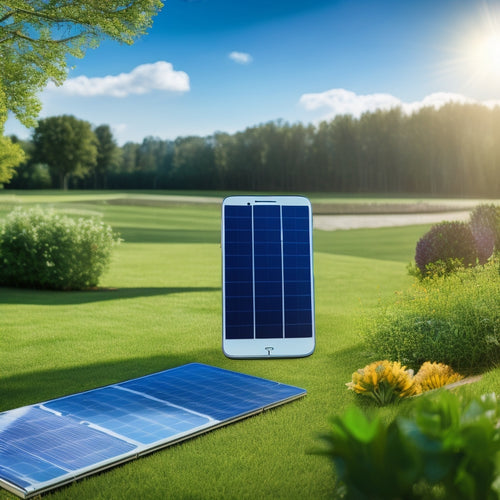
Why Choose Composting Toilets for Off-Grid Adventures?
Share
You opt for composting toilets for off-grid escapades because they enable eco-friendly waste management, reducing your environmental impact and promoting sustainability. These self-sufficient systems conserve water, employ renewable energy, and minimize infrastructure and maintenance needs. Plus, they reduce pest attraction, provide privacy, and enhance the overall sustainability of remote cabin living. By choosing composting toilets, you'll not only reduce your carbon footprint but also contribute to a cleaner, healthier environment. As you journey into the wilderness, you'll uncover even more benefits that come with embracing this sustainable solution - and how it can improve your off-grid experience.
Key Takeaways
- Composting toilets reduce environmental impact by minimizing water usage and waste, making them an eco-friendly choice for off-grid adventures.
- They provide a practical alternative to costly plumbing systems, ideal for isolated areas with limited infrastructure and maintenance.
- Composting toilets utilize natural processes for waste breakdown, promoting sustainable practices and reducing the risk of water pollution.
- They offer a convenient, odorless, and mess-free experience, enhancing sanitation and hygiene in remote areas.
- By adopting composting toilets, off-grid adventurers can promote ecological responsibility and reduce their carbon footprint.
Off-Grid Freedom With Composting Toilets
As you venture off the beaten path, the last thing you want to worry about is where to do your business. But with a composting toilet, you can focus on enjoying the freedom of an off-grid lifestyle without the hassle of finding a bathroom.
Composting toilets are a transformative solution for sustainable living, allowing you to manage your waste in a way that's environmentally friendly and self-sufficient. By utilizing renewable energy solutions like solar energy implementation, you can power your off-grid journey with a reduced carbon footprint.
Additionally, incorporating hybrid electric solutions can further lower emissions and improve fuel efficiency. By breaking down waste into a precious compost, you'll reduce your impact on the environment and create a closed-loop system that's perfect for off-grid excursions.
With a composting toilet, you'll have more time to focus on what matters – exploring the great outdoors and living life on your own terms.
Water Conservation in Remote Areas
Nearly 70% of the Earth's surface is water, but only a tiny fraction is available for human consumption. When venturing off-grid, you'll quickly realize how essential this resource is. Water conservation becomes vital in remote areas where accessibility is limited.
To reduce reliance on fossil fuels, incorporating renewable energy sources like solar or wind power can also contribute to a more sustainable off-grid journey. You can start by implementing rainwater harvesting systems to collect and store rainwater for non-potable uses like flushing toilets and washing clothes.
Sustainable landscaping practices also play a significant role in conserving water. By choosing drought-resistant plants and using efficient irrigation systems, you'll reduce your water needs.
Efficient Waste Management Systems
When you're off the grid, you need to think carefully about how you'll manage waste.
You'll want to reduce the amount of waste you generate in the first place, and then find eco-friendly ways to dispose of what's left. By implementing waste reduction strategies and eco-friendly disposal methods, you can minimize your environmental impact and keep your journey site clean and safe.
Additionally, incorporating renewable energy sources sustainable road trip amenities into your off-grid setup can further reduce your carbon footprint.
Waste Reduction Strategies
Your off-grid expedition wouldn't be complete without a solid waste reduction strategy in place. This is where composting toilets come in, offering a sustainable solution to your waste management needs.
By choosing a composting toilet, you'll reduce your waste output considerably, making it easier to manage and maintain a clean campsite. Additionally, incorporating eco-friendly energy sources, such as solar fleet solutions, can further minimize your environmental impact.
The composting benefits are twofold: not only will you minimize your environmental impact, but you'll also reduce the risk of attracting pests and wildlife to your camp.
With a composting toilet, you'll enjoy the freedom to venture off-grid, knowing you're taking care of the environment and your own waste management needs.
Eco-Friendly Disposal Methods
Beyond the composting toilet itself, an essential aspect of efficient waste management lies in eco-friendly disposal methods. You'll want to confirm that the waste is handled in a way that supports sustainable living.
Composting toilets allow for natural decomposition, but you'll still need to dispose of the final product. Consider burying it in a designated area or using it as fertilizer for non-edible plants. Another option is to repurpose the compost as a natural pest repellent or additive for your off-grid garden.
Renewable energy sources like solar and wind power can also be used to power composting toilet systems, further reducing their environmental impact. Additionally, utilizing geothermal energy can provide a reliable source of power for these systems.
Whatever method you choose, make certain it aligns with your values and doesn't harm the environment. By embracing eco-friendly disposal methods, you'll be taking a significant step towards minimizing your ecological footprint and living in harmony with nature.
Environmental Impact of Traditional Toilets
When you opt for traditional toilets, you're contributing to water pollution risks and wastewater treatment inefficiencies that harm the environment.
Moreover, the adoption of sustainable alternatives is essential for mitigating climate change, as seen in the electric vehicles revolution.
Traditional toilets require massive amounts of water to function, which can lead to contaminated waterways and aquatic ecosystems.
In addition, wastewater treatment plants often struggle to remove pollutants and pathogens, allowing them to seep into groundwater and surface water.
Water Pollution Risks
I've seen the devastating effects of water pollution firsthand, and it's a harsh reality that traditional toilets play a considerable role in this environmental issue.
As we shift to a more sustainable future, it's crucial to evaluate the impact of our daily habits, including the electrification of transportation Electric Vehicles Sparking Sustainable Revolution.
When you flush a traditional toilet, you're contributing to the toxic runoff that contaminates our waterways and disrupts ecosystems. The pollutants from wastewater can harm aquatic life, contaminate soil, and even affect human health.
As someone who values freedom and the great outdoors, you probably don't want to be part of the problem. By choosing a composting toilet, you'll greatly reduce your water pollution risks and help preserve the natural beauty of our environment.
It's a small change that can make a big difference.
Wastewater Treatment Inefficiencies
By the time wastewater reaches a traditional treatment plant, it's already a complex cocktail of contaminants.
You're likely aware that wastewater treatment is a significant sanitation challenge, but did you know it's often ineffective? Wastewater treatment plants can't remove all pollutants, and sometimes they even release untreated wastewater into the environment.
-
Wastewater treatment plants can't remove all pollutants, including microplastics, pharmaceuticals, and other harmful chemicals.
-
Inadequate treatment can lead to waterborne diseases and harm aquatic life.
-
Traditional toilets contribute to wastewater treatment inefficiencies, making them a significant environmental concern.
The inefficiencies of traditional wastewater treatment plants are a significant environmental concern, and it's time to reflect on alternative solutions.
Composting Toilets for Remote Cabins
For remote cabins, composting toilets offer a dependable and eco-friendly solution to traditional plumbing systems, which can be costly and impractical to install in isolated areas.
As you consider installing a composting toilet in your remote cabin, you'll want to think about privacy considerations. Since these toilets often require frequent emptying and maintenance, you'll need to guarantee you have a private area for this task.
Additionally, installation challenges may arise due to limited access to the cabin or harsh weather conditions. However, with careful planning and preparation, a composting toilet can provide a convenient and environmentally friendly solution for your off-grid escapade.
Benefits of Self-Contained Systems
As you weigh the options for your off-grid journey, self-contained composting toilets stand out for their convenience and ease of use.
These systems are designed to be user-friendly, with a straightforward installation process and minimal maintenance requirements. This makes them a cost-effective solution for your off-grid expedition.
-
They eliminate the need for complex plumbing and sewage systems, reducing the overall cost of your setup.
-
Self-contained composting toilets are typically compact and lightweight, making them easy to transport and install in remote locations.
-
With a self-contained system, you'll have peace of mind knowing that your waste is being managed safely and efficiently, allowing you to focus on enjoying your off-grid experience.
Reduced Carbon Footprint Outdoors
You can greatly reduce your carbon footprint outdoors by choosing a composting toilet for your off-grid expedition.
Traditional toilets require a significant amount of energy and resources to function, contributing to greenhouse gas emissions. In contrast, composting toilets are a sustainable solution that employs natural processes to break down waste, producing a worthwhile compost byproduct.
By adopting this eco-friendly option, you'll minimize your impact on the environment and promote sustainable practices that align with your outdoor lifestyle.
Composting toilets are a crucial component of a responsible and environmentally conscious off-grid experience, allowing you to connect with nature while preserving it for future generations.
Increased Sanitation and Hygiene
Inside your off-grid expedition, composting toilets bring a higher level of sanitation and hygiene to the forefront.
You'll appreciate the improved hygiene practices and sanitation solutions they provide, especially in remote areas where traditional toilet systems may be lacking.
- Reduced risk of waterborne diseases and contamination
- Efficient management of human waste, minimizing environmental impact
- Odorless and mess-free experience, enhancing overall comfort and well-being
Frequently Asked Questions
Can Composting Toilets Handle a High Volume of Users?
You wonder if composting toilets can handle a crowd. The truth is, some models can, but it depends on the type and size. Look for toilets with high user capacity, ensuring a seamless user experience, even with multiple visitors, without compromising the composting process.
Are Composting Toilets Suitable for Cold or Freezing Temperatures?
You'll find that composting toilets can thrive in cold climates when you employ effective insulation methods, but you must consider temperature effects, as freezing temps can slow decomposition, requiring adjustments to your maintenance routine and carbon-to-nitrogen ratios.
Do Composting Toilets Require Frequent Emptying or Maintenance?
You'll find that composting toilets require minimal maintenance, allowing you to focus on your journey, not frequent emptying. With proper use, you'll enjoy a hassle-free user experience while reaping environmental benefits, like reduced water consumption and waste diversion.
Can I Install a Composting Toilet Myself or Do I Need a Professional?
Ha! You think you're not a plumber, but with the right installation tips, you can DIY like a pro! Welcome the DIY advantages and take control - you won't need a professional, and your off-grid journey will be even more liberating.
Are Composting Toilets More Expensive Than Traditional Toilet Systems?
You'll find that composting toilets are often pricier upfront, but they offer a cost comparison advantage through long term savings on water and waste management, making them a smart investment for your off-grid freedom.
Related Posts
-

7 Best EV Battery Health Trackers for Homeowners
You can maximize your electric vehicle's performance and lifespan by leveraging advanced battery health trackers that...
-

Why EVs Inspire Earth-Conscious Home Design Choices
As you shift to an electric vehicle, you're not just switching to a greener ride, you're igniting a broader commitmen...
-

7 Best Solar Panel Upkeep Apps for Homeowners
You can optimize your solar panel's energy output and efficiency by up to 20% with regular maintenance, which is wher...


